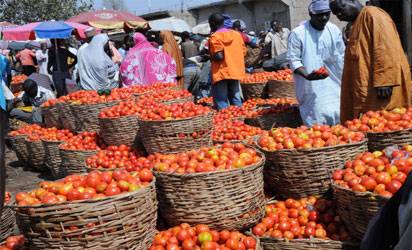According to Shehu Usman Jubrin, the Chairman of the Mile 12 International Market in Lagos State, the country’s recent high prices for perishable goods like tomatoes and peppers are a result of insecurity.
Jubrin revealed this on Monday during an interview on Channels Television. Recall that pepper has also become more expensive, which has Nigerians worried. At the market, a modest basket of tomatoes costs almost N35,000.
Jubrin commented on the development, saying, “The real fact is just insecurity. That’s the bone of contention.” That is the truth, let me tell you. Furthermore, the nation will do nothing at all.
“This price increase will go up.”They continue to purchase tomatoes, paying N1,000 for three pieces.Farmers make about 99% of those living in camps for internally displaced persons. Both men and women are ignorant of anything but farming.
Of the approximately 5,000 farmers in the nation, only roughly 1,500 work as blind farmers. Before they can visit their farms to gather the produce, he claims that some of the farmers bargain with and pay the robbers.
“There are negotiations between them and the bandits who ask them, ‘How much are you going to pay me to harvest and bring to the market?'” he continued, “in those places where you are getting all these items.”
“So, the nation will continue to face food shortage issues as long as those people remain in IDP camps.” He connected it to further elements as well, such as a lack of supplies coming from Nigeria’s north to the south.
“First, let me just talk about tomatoes.” You have them from the North in November, December, January, February, March, and April through May.
“Katsina state is followed by Danja, Danjumi, Kadawa, and Kano. Since it is currently the off-season, tomatoes from Osun, Ilaro, Abeokuta, and Gbomosho should be arriving in Lagos as well as parts of Cameroon.

high cost of tomato
That serves as a sort of stand-in for the one in the north. “Unfortunately, the ones from Cameroon, Abeokuta, and Ogbomosho are late. In addition, it will become more costly as the holiday season draws near.
There are no more tomatoes from the south, and the ones from the north are finished. Additionally, he attributed the low harvests to the diseases and blamed pests for the issue.










